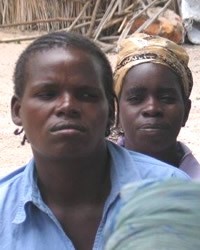The Mbunda people speak the Mbunda language, which belongs to the Bantu branch of the Niger-Congo language family. Their origins trace back to migrations from present-day Zambia into southeastern Angola several centuries ago. Over time, the Mbunda established their own political structures and cultural identity, and they became known as a distinct ethnic group within the region. During the colonial era and Angola's civil conflicts, many Mbunda were displaced, but they have continued to maintain their traditions, language, and sense of community.
The Mbunda live primarily in rural villages, where farming is the backbone of their economy and daily life. Families cultivate cassava, maize, millet, sorghum, and groundnuts as staple crops. In addition to farming, they supplement their diet with hunting, fishing, and small-scale animal husbandry. Villages are typically organized around extended families, with community ties playing an essential role in work, celebrations, and social order. The Mbunda are renowned for their rich cultural expressions in music, storytelling, and dance. Their skilled craftsmanship, particularly in woodcarving and the creation of ceremonial masks, reflects a rich artistic heritage. While modern influences are gradually reaching Mbunda communities, many still hold tightly to traditional practices and ways of life.
The Mbunda traditionally practice ancestor veneration, believing that the spirits of the dead continue to influence the living. Rituals, sacrifices, and offerings are made to ensure harmony and protection. Spirit mediums and diviners are often consulted to address illness, misfortune, or community decisions. Christianity has spread among the Mbunda, with both Catholic and Protestant churches present in the region. However, syncretism is common, and traditional beliefs are often blended with Christian practices. For many Mbunda, the gospel is still overshadowed by fear of spirits, reliance on rituals, and trust in traditional healers.
The Mbunda face significant physical and spiritual needs. Access to healthcare is limited, leaving communities vulnerable to preventable diseases and poor maternal health outcomes. Clean water and sanitation are often lacking, and educational opportunities are scarce, especially for children in remote villages. Spiritually, the Mbunda need access to clear and faithful teaching of the gospel in their own language. While some Bible translation work exists, there is still a need for accessible Scripture portions, discipleship materials, and trained local leaders who can communicate biblical truth in culturally meaningful ways. The Mbunda also need faithful Christian workers who are willing to live among them, build relationships, and patiently share the hope of Christ.
May believers among the Mbunda grow strong in their faith, resist the pull of syncretism, and courageously share the love of Christ with their neighbors.
Ask God to bring greater access to healthcare, education, and clean water, improving their daily lives in tangible ways.
Pray that God would raise up local Christians to take Christ's name to Muslims and others who are not covered by the blood of Christ.
Pray that the Mbunda Christians would devote their lives to the Great Commission.
Scripture Prayers for the Mbunda in Angola.
Childs, Gladwyn Murray. The Kingdom of the Mbunda in Angola. London: International African Institute, 1949.
Birmingham, David. A Short History of Modern Angola. Oxford: Oxford University Press, 2015.
Hoover, J. Jeffrey. The History of the Mbunda
| Profile Source: Joshua Project |











